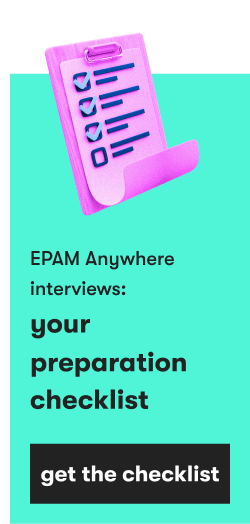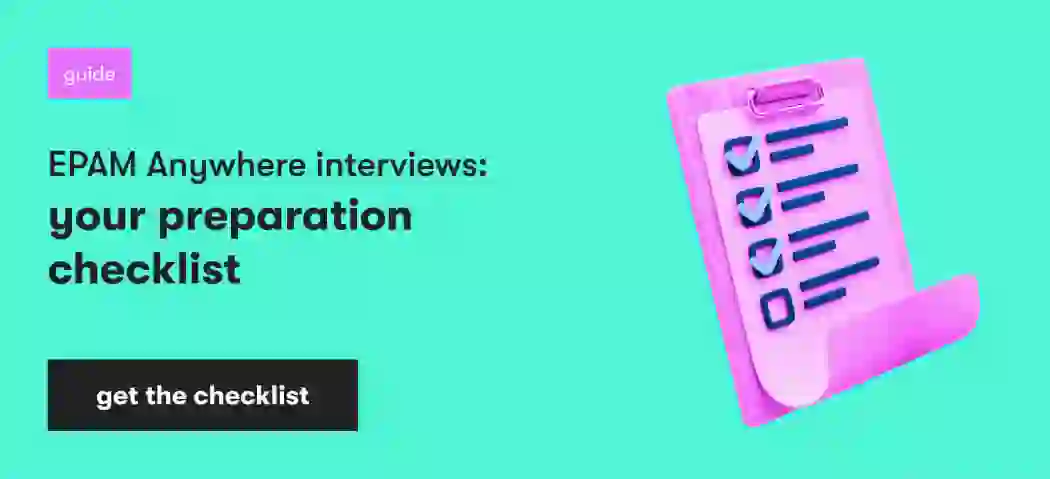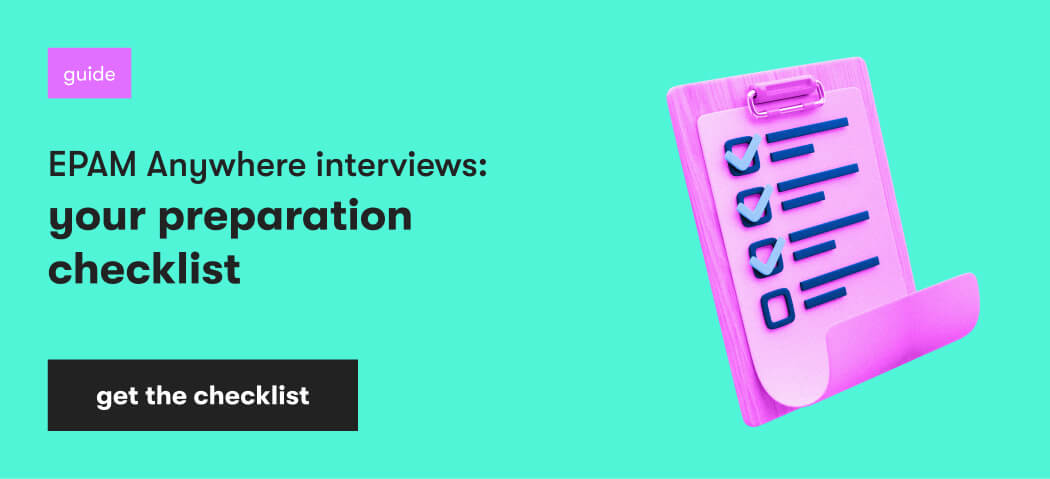When getting ready for job interviews at Anywhere or another company, job seekers should familiarize themselves with the questions to ask before accepting a job. Often, it’s best to do this right after preparing your answers for the phone screen and technical interview questions, so this important step doesn’t get overlooked.
Both in-office and remote jobs in tech come with formalized job contracts, and the information that’s contained in them matters. Additionally, asking questions allows you to learn more about the company, the role, and the company’s culture to help you assess your fit, ensuring that you can move forward confidently after receiving an offer.
The areas of questions to ask when offered a job
The questions we recommend asking the hiring manager after an offer help you gather additional insights in a few key areas. These inquiries differ from the questions to ask the recruiter before the interview. Since you’re more familiar with the role after your interview, you can fill in critical information gaps, making it easier to decide if the job is right for you.
If you aren’t sure what to bring up with the hiring manager at this stage, here is a list of the key categories of questions to ask before accepting a job in tech, which you can study in detail below:
- Questions about job offer terms
- Questions about your future role
- Questions about the company
- Self-check questions
Questions to ask about job offer terms
Does the company have room to negotiate?
This is one of the most straightforward questions to ask about a job offer as soon as you have one in hand. It lets you know if negotiating is on the table or if the offer is considered firm.
What benefits will I receive, and when do I become eligible for them?
Some job offers don’t include a formal list of every benefit you’ll receive, such as health insurance, retirement plan options, paid time off, and more. This question helps you clarify the total value of any non-salary compensation, and when you’ll have access to those benefits. It’s one of the most crucial questions to ask before accepting a job.
How are bonuses and raises determined?
Bonuses and raises can significantly boost your earnings. Knowing how they’re calculated, the requirements you need to meet, and any other relevant details lets you estimate your potential access to these kinds of additional compensation.
Can I get all of the aspects of the job offer in writing?
Whether you negotiate for a new deal or decide the latest offer presented by the hiring manager is acceptable, finding out if you can get every aspect of the offer in writing is one of the most crucial questions to ask when offered a job. Anything that isn’t formally contained in the contract may not be binding, so any missing details about benefits, bonuses, or anything else need to be included.
Additionally, a refusal by the hiring manager to put everything in writing could be a red flag. Declining to document the offer in a thorough manner lets the employer potentially alter terms as things unfold, and you’ll have little legal recourse if that happens.
Questions to ask about your future role
Can you outline a typical day in this job?
During the hiring process, most hiring managers showcase the most intriguing aspects of the role. You also want to know what an average day in the position is like, though, so you can see past the glitz and get a glimpse into the real daily grind.
This is an excellent question to ask when you receive an offer. It’s also, however, one of the questions to ask the recruiter during the phone screen interview, since that lets you begin assessing the job earlier in the process.
Can you describe the onboarding process?
While onboarding doesn’t last forever, a lengthy and comprehensive onboarding process often sets you up for success. If the hiring manager describes a process that lasts only a few days or a week or two, that could indicate less support than you may want.
How is success measured in this position?
This is one of the most critical questions to ask when offered a job because it gives you insights into the manager’s expectations and priorities. As a result, you’ll know where to focus if you want to ensure that you impress.
What’s a typical work schedule for this role? Also, are there periods of mandatory overtime, or times when I’ll be on-call?
Understanding the exact schedule you’re expected to work helps you determine if the compensation is fair. Additionally, it lets you decide if the job provides sufficient work-life balance based on your responsibilities outside of the workplace.
Are training and professional development opportunities regularly available?
Knowing whether the role comes with opportunities to grow and advance lets you decide if the job meets your longer-term needs. This is one of the most important questions to ask about a job offer, since you’ll get insights into your access to training and professional development programs that can support your career.
Questions to ask about the company
What’s the average tenure of employees at this company? What about in this role specifically?
With this question, you can find out whether turnover at the company and in the particular role is high or low. Ideally, you want to see tenures of at least several years.
How would you describe the company culture and the existing team dynamic?
Assessing a company culture or team dynamic from the outside is challenging, which is why this is one of the most critical questions to ask when offered a job. The manager knows how the organization and team function, so their insights are valuable.
Does the company have an employee wellness program?
While this may seem like a question about available benefits, it actually provides you with clues about the broader employee experience. Well-developed wellness programs show that the company works to maintain the physical, mental, and emotional well-being of its staff, which is a demonstration of the broader company culture.
Can you describe any diversity, equity, and inclusion initiatives?
This is one of the crucial questions to ask a hiring manager after an offer because diversity, equity, and inclusion initiatives are indicative of the broader culture. Again, well-designed initiatives are a positive sign.
Can you tell me about the leadership style employed by company leaders?
Even if you aren’t working directly under the CEO or another executive, this is an essential question to ask. Understanding their leadership style lets you assess aspects of the culture, since individuals in their positions often shape the organization.
Self-check questions
Am I comfortable with the time-related requirements outlined for this role?
Every job has unique time-related requirements. Some tech roles have a standardized work week without any chance of overtime. Others may involve crunch periods, regular mandatory overtime, or on-call periods, as well as commutes.
Making sure you’re comfortable with the time-related requirements lets you determine how the role fits into your schedule. This question is a critical self-check.
Does the salary meet my needs?
Determining whether the salary makes sense based on the role, responsibilities, and required skill levels lets you ensure that it’s competitive. You also need to ascertain that it meets your financial needs. Consider whether it will cover your expenses after any mandatory deductions, such as taxes.
What did I think of my future coworkers and managers?
Not all personalities mesh well together. You need to decide if the manager’s leadership style is a match for your needs. Additionally, reflecting on your coworkers’ attitudes and likeability helps you determine whether the current composition of the team itself is a good fit.
Does the company culture feel like a fit?
Even if a company offers a solid employee experience, if the culture isn’t a match to your preferences, it may not be the right employer for you. Some professionals thrive in fast-paced environments where change is common; others need a more stable environment. Determine whether you’re okay with how the company operates in this regard before moving forward.
How long do I envision staying in this role?
Reflecting on the nature of the job and estimating how long you can envision staying in it can be enlightening. Doing so lets you know if you feel that there’s enough value to remain in it for several years, and any hesitation on your part could signal that there’s something about the job that isn’t resonating with you.
Why ask questions at the job offer stage?
By seizing opportunities to get answers to these questions at the job offer stage, you’re giving yourself a chance to determine if the role is a genuine fit for your needs before you commit to the position. Examining the compensation, company culture, team dynamic, and the nature of the position more deeply, allows you to fill in gaps in your knowledge and make a more informed decision.
If you might need more time to consider a position, knowing how to ask for an extension on a job offer is a must. That allows you to present your request correctly, ensuring you’ll continue to make a positive impression while you decide.

With a focus on remote lifestyle and career development, Gayane shares practical insight and career advice that informs and empowers tech talent to thrive in the world of remote work.
With a focus on remote lifestyle and career development, Gayane shares practical insight and career advice that informs and empowers tech talent to thrive in the world of remote work.
Explore our Editorial Policy to learn more about our standards for content creation.
read more
























